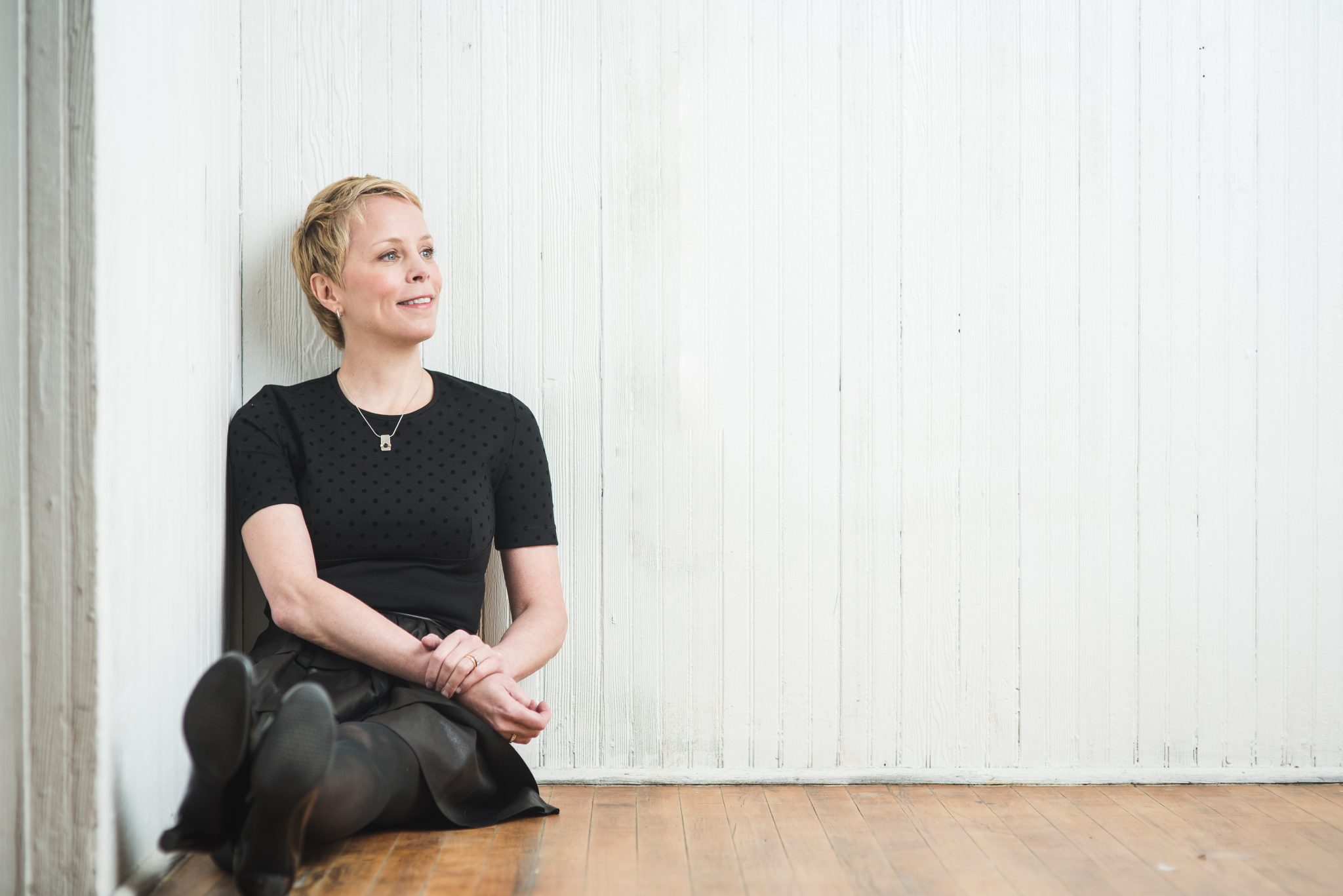Augusta Read Thomas: Toward A Secret Sky
Words by Kyle Long
On Friday, April 28 the Indianapolis Symphonic Choir will premiere a newly-commissioned work by the Pulitzer Prize-nominated composer Augusta Read Thomas. The piece is titled Toward A Secret Sky, and it features texts by the beloved 13th-century Persian poet Rumi.
Thomas’ name should be familiar to Indianapolis concert concertgoers; her composition Sun Dance was premiered by the Indianapolis Symphony Orchestra earlier this year. Thomas is a prolific figure in the world of contemporary classical music. She’s one of the most performed living composers, and her music has been championed by classical music giants including Pierre Boulez, Lorin Maazel, and Seiji Ozawa. In addition to her work as a composer, Thomas is a University Professor of Composition in Music at The University of Chicago.
Thomas discussed her rich history in music with CMI contributor Kyle Long.

Kyle Long: You grew up playing piano and trumpet at an early age. You also started composing at an early age. As we get started, I thought it would be helpful if you shared a bit about your early musical experiences.
Augusta Read Thomas: I’ve always loved music. I remember when I was a child, we had this rickety old piano, and I used to lie underneath it and listen to the sounds. I wanted to play the piano and I started making up little songs that were like a single note. I’d say, “Mom, I wrote a song!” So I was super into music and constantly followed that.
As you mentioned, I played trumpet through college, I played piano for 14 years, I sang in choirs, I played in a brass quintet, and so on. So it’s been a dimensional musical background in the sense that I didn’t just play one instrument and then start composing. Creating and being in music was holistic.
Long: You’ve been described as a “poet composer”, as opposed to a “novelist composer”. That seems like a crucial distinction to understand the way you approach writing music.
Thomas: I love how every word is critical in a poem. If you move one word, the whole poem changes. It’s very precise. One thing that’s interesting to me about poetry is that if you have, let’s say, an eight-line poem, it might take you 12 pages to describe what’s going on in that poem, but the poet did it in eight lines. There’s a precision of thought in poetry.
The work I’ve done with the Indianapolis Symphonic Choir is huge. It’s 36 minutes long. Someone might say, “That’s not a poem.” But if you look locally, it’s highly crafted to every 16th note, and that’s the poetic side of the work.
Long: You were the composer-in-residence for the Chicago Symphony from 1997 to 2006. During that time you worked with prominent conductors, including Pierre Boulez and Daniel Barenboim. You also wrote your Pulitzer Prize-nominated work “Astral Canticle” during that time. It seems like this residency was a major turning point in your life and career.
Thomas: In some ways, I feel that every minute is a turning point in my life. Every project, every person I meet, every opportunity I have is a turning point. But, you’re right, that residency was an incredible situation, and I loved every day there. It was a long residency, I wrote nine symphonic works, built the MusicNOW series, hosted many composers, and gave around 50 pre-concert lectures per year. It was a vast experience that I feel grateful for and humbled by.
At that point, I had already written a lot of orchestral music because I’d been obsessed with music since I was a little girl. So when I was first offered a commission for the symphony, I had already written 20 orchestral pieces, which sounds ridiculous because I was so young. But I was really weird, and I was writing symphonies all day long. They were mostly really bad, by the way. [laughs]
In any case, Mr. Barenboim and Mr. Boulez heard one and liked it, and said, “Hire her.” So I wrote a piece, and it turned out that they really liked that piece, and they ended up recording it and touring it. After that, they asked me to write another piece, which was the best news a composer could ever get. From there they invited me to be their composer-in-residence. So the opportunity arose from a body of work I had made, it was a holistic next step in the journey I had been on.
Long: We talked about your early life as a trumpet player. You’ve been influenced by many styles of music, including jazz. I’ve read that Louis Armstrong and Miles Davis had a significant influence on your work. In fact, you’ve called Miles Davis’ recordings with John Coltrane “chamber music of the highest order.” How has jazz influenced your work as a composer?
Thomas: As a kid, Louis Armstrong was my idol. I used to play along with his albums, pretending I could play the trumpet with him, and scatting along to Ella Fitzgerald. Louis and Ella were my most beloved childhood idols. I was obsessed with them.
When we look at the history of American music, you could argue that the great American music is jazz. I would make that argument, and jazz has greatly influenced me. I think you can hear that in my music. You can also hear that I’ve heard the great orchestral repertoire, and that I know Ravel, and that I know Stravinsky, and so forth. You can also hear that I’ve heard some world music, some pop, some hip-hop, and bebop.
One of the things that I love about jazz is the sense of spontaneity. I feel that all of my works are captured improvisations – meaning that I’m improvising, capturing it, and codifying it. I like that sense of spontaneity, you don’t know what I’m gonna do next. But as soon as I do it, you’re like, “Oh, that was logical. But I wouldn’t have thought of that.” It’s that kind of quick thinking that jazz artists have.
Another way it materializes in my work can be heard in Sun Dance, which was commissioned by the Indianapolis Symphony Orchestra. Sun Dance was commissioned to be in front of Beethoven’s Sixth Symphony, which is the Pastoral Symphony. So I thought, “Well, what do you do before the Pastoral Symphony? You need a sunrise, right?” So I wrote this huge sunrise, and that’s what the piece is. You can go straight from my piece into the Beethoven’s Sixth Symphony because it’s composed for the exact same instrumentation. But in any case, it’s got a relation to jazz, and that has to do with groove. I like things where you don’t exactly know what the next beat is going to be, you don’t quite know where the rhythm is, but it’s sort of in the groove. That comes across a little like Stravinsky, but actually, I’m hearing it coming from big band music and Stravinsky.
I think I really bridge both worlds in my music. But not in a way that it’s like, “Oh, there’s her jazz bit, and now she’s doing the classical bit.” It’s not like that at all. It’s totally integrated at the deepest level.
 Long: Perhaps the most unique piece you’ve written is the opera Sweet Potato Kicks the Sun, which premiered in 2019. The opera centers around the beatbox vocalist Nicole Paris. For those who aren’t familiar, beatboxing is a vocal style associated with hip-hop music that mimics percussion sounds. Tell us about this work, and how you stumbled onto the idea of featuring a beatboxer in your opera?
Long: Perhaps the most unique piece you’ve written is the opera Sweet Potato Kicks the Sun, which premiered in 2019. The opera centers around the beatbox vocalist Nicole Paris. For those who aren’t familiar, beatboxing is a vocal style associated with hip-hop music that mimics percussion sounds. Tell us about this work, and how you stumbled onto the idea of featuring a beatboxer in your opera?
Thomas: That piece was very true to my whole soul because I’ve been scatting since I was a little girl listening to Ella. So when I had the good fortune to create this opera, the first thing I thought was I should do a piece for a beatboxer, percussion quartet, and small ensemble – plus the chorus, the children’s chorus, and the other singers.
To me, this was completely normal. But sometimes presenting organizations already have an idea of what they want. So when you go to an opera company, and you’re like, “I want to feature a beatboxer.” They’re like, “Excuse me, what did you say?” [laughs] So you kind of have to convince people of the idea. But anyone who knows my music would be like, ”Oh, that’s totally obvious, that has Augusta Read Thomas written all over it.” So it felt very true and fun.
The beatboxer Nicole Paris is one of the most beautiful, kind, radiant, and stunning people on the planet. But it was very interesting for her because she doesn’t read music, and she’d never been to an opera – which is fine. The whole thing was completely out of her world, but I was like, “No, no, no, you’re gonna be great.” She was insanely fabulous. In addition to her beatbox side, she has this incredible trained, natural voice.
I really want to record that piece. I can’t do it at the moment, but at some point, before I die, that’s a priority for me. Because we did one performance, and then the pandemic hit, and we canceled seven shows. We don’t have a document of the show, because we were planning to record the seventh performance. That was such a heartbreak for me.
Long: On April 28th you’re premiering a new work with the Indianapolis Symphonic Choir titled Toward A Secret Sky, which is based on the work of the famous 13th-century Persian poet Rumi. Tell us about Toward A Secret Sky.
Thomas: The poet Rumi is one of the most beloved poets in the world, in pretty much every language. He has the most beautiful, forward-looking, eloquent poetic imagery. He speaks a lot about love in his writings, and love not just like, “I love you, you love me”, but cosmic love, and the depth of love, and the importance of love. I thought this was a beautiful message, and I wanted to write something optimistic, but also rich with these beautiful themes and gorgeous words.
His texts are kaleidoscopically varied – some of them are very playful, and some of them are deeply heart-wrenching. It has a dramatic and emotional palette. The piece is 36 minutes long. I built it in nine sections, which are structured around nine Rumi texts that have different, for lack of a better word, perfumes to them. So I wanted the music to set a different scene, but I build transitions between them, and it’s played without a pause. On the other hand, when you get to the next section, you’ll think, “Oh, we’re in a new section.” It’s very tightly formed in terms of the balance between the form and the material.
Hopefully, it should be an immediately accessible, colorful, rich experience with this fantastic chorus. Eric Stark is an amazing conductor, and then of course, the ISO will be playing the orchestral parts. It was a huge project, it took me many years to write, so I’m very excited for the premiere. The title Toward A Secret Sky is wildly poetic, evocative, and beautiful. Those are the words of Rumi, and every word in the piece is Rumi. I’m just the lucky beneficiary to set those texts.







Leave a Reply